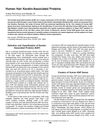 August 2019 in “Research Square (Research Square)”
August 2019 in “Research Square (Research Square)” Certain long non-coding RNAs in cashmere goats affect hair growth when treated with a specific growth factor.
[object Object] 
A 44-year-old woman with Down's syndrome was diagnosed with both rheumatoid and gouty arthritis and treated with multiple medications.
 22 citations,
April 1998 in “Dermatologic Clinics”
22 citations,
April 1998 in “Dermatologic Clinics” Interferons are effective for some skin conditions and cancers, but can have side effects and need more research for optimal use.
 April 2018 in “Nasza Dermatologia Online”
April 2018 in “Nasza Dermatologia Online” People with Down's syndrome are more likely to have syringomas.
 107 citations,
December 2003 in “Dermatologic Therapy”
107 citations,
December 2003 in “Dermatologic Therapy” Interferon, especially alfa interferon, is an effective treatment for cutaneous T-cell lymphoma with manageable side effects.
 71 citations,
March 2009 in “Seminars in cutaneous medicine and surgery”
71 citations,
March 2009 in “Seminars in cutaneous medicine and surgery” Alopecia areata can cause unpredictable hair loss, and treatments like corticosteroids and minoxidil may help but have varying side effects.
 28 citations,
August 2001 in “Journal of cutaneous medicine and surgery”
28 citations,
August 2001 in “Journal of cutaneous medicine and surgery” People with Down's syndrome often have more skin problems due to a weak immune system.
 January 2019 in “Przegląd Dermatologiczny”
January 2019 in “Przegląd Dermatologiczny” Patients with one autoimmune disease should be checked for other autoimmune disorders.
 December 2016 in “Springer eBooks”
December 2016 in “Springer eBooks” A 45-year-old woman with autoimmune diseases experienced patchy hair loss due to alopecia areata, which has no cure but can be treated, with varying success.
 January 2015 in “Przegla̧d dermatologiczny”
January 2015 in “Przegla̧d dermatologiczny” Intralesional triamcinolone is the most effective treatment for alopecia areata, followed by excimer light therapy, and then topical minoxidil. The scalp responds better to treatment than the beard area.
 82 citations,
June 2020 in “Inflammation Research”
82 citations,
June 2020 in “Inflammation Research” Skin problems in COVID-19 patients are rare and may be due to the body's complex immune response or blood clotting issues.
 81 citations,
July 2012 in “Translational Psychiatry”
81 citations,
July 2012 in “Translational Psychiatry” Memantine may slightly improve memory in people with Down syndrome, but more research is needed.
 49 citations,
April 2000 in “Journal of The American Academy of Dermatology”
49 citations,
April 2000 in “Journal of The American Academy of Dermatology” Despite progress in treatment, the exact cause of Alopecia areata is still unknown.
 41 citations,
November 2020 in “Colloids and surfaces. B, Biointerfaces”
41 citations,
November 2020 in “Colloids and surfaces. B, Biointerfaces” Different hair protein amounts change the strength of keratin/chitosan gels, useful for making predictable tissue engineering materials.
 35 citations,
April 2014 in “Journal of proteomics”
35 citations,
April 2014 in “Journal of proteomics” Feed restriction in sheep leads to finer wool fibers but may reduce wool quality.
 17 citations,
July 1994 in “Journal of Dermatological Science”
17 citations,
July 1994 in “Journal of Dermatological Science” The cause of alopecia areata is likely a mix of genetics, immune system issues, and environmental factors, with more research needed to understand it fully.
 11 citations,
January 2000 in “Journal of Cutaneous Pathology”
11 citations,
January 2000 in “Journal of Cutaneous Pathology” Short telomeres contribute to aging and cancer, and while telomerase can delay aging, it may also promote cancer.
 10 citations,
May 2020 in “Journal of proteome research”
10 citations,
May 2020 in “Journal of proteome research” Explosions don't stop hair proteins from being used to identify people.
 8 citations,
October 2019 in “Immunological investigations”
8 citations,
October 2019 in “Immunological investigations” The AIRE gene variant rs2075876 is linked to a higher risk of alopecia areata in males.
 8 citations,
June 2012 in “PloS one”
8 citations,
June 2012 in “PloS one” Mutations in Plcd1 and Plcd3 together cause severe hair loss in mice.
 2 citations,
January 2017 in “Folia biologica”
2 citations,
January 2017 in “Folia biologica” The KRTAP7-1 gene is very similar across different cattle and yak breeds and likely plays a role in hair strength and shape.
 March 2024 in “medRxiv (Cold Spring Harbor Laboratory)”
March 2024 in “medRxiv (Cold Spring Harbor Laboratory)” Recent selection on immune response genes was identified across seven ethnicities.
 January 2017 in “IMC Journal of Medical Science”
January 2017 in “IMC Journal of Medical Science” A rare endocrine disorder, APS 1, was diagnosed in a 26-year-old man in Bangladesh.
 185 citations,
August 2005 in “Autoimmunity Reviews”
185 citations,
August 2005 in “Autoimmunity Reviews” Alopecia areata is an autoimmune condition causing hair loss due to the immune system attacking hair follicles, often influenced by genetics and stress.
[object Object]  148 citations,
December 2018 in “Journal of autoimmunity”
148 citations,
December 2018 in “Journal of autoimmunity” Alopecia areata is an autoimmune disease causing patchy hair loss, often with other autoimmune disorders, but its exact causes are unknown.
 80 citations,
June 2020 in “Dermatopathology”
80 citations,
June 2020 in “Dermatopathology” COVID-19 can cause various skin lesions, which may result from the virus and immune response, and are not directly linked to illness severity.
 71 citations,
August 2005 in “The journal of investigative dermatology. Symposium proceedings/The Journal of investigative dermatology symposium proceedings”
71 citations,
August 2005 in “The journal of investigative dermatology. Symposium proceedings/The Journal of investigative dermatology symposium proceedings” Hair keratin-associated proteins are essential for strong hair, with over 80 genes showing specific patterns and variations among people.
 55 citations,
November 2018 in “American journal of human genetics”
55 citations,
November 2018 in “American journal of human genetics” Mutations in the LSS gene cause a rare type of hereditary hair loss.
 42 citations,
January 2017 in “Genes”
42 citations,
January 2017 in “Genes” The gene KAP22-1 affects wool yield and fiber shape in sheep.
 38 citations,
October 2011 in “Analytical biochemistry”
38 citations,
October 2011 in “Analytical biochemistry” Hair proteins have weak spots in their α-helical segments.





























